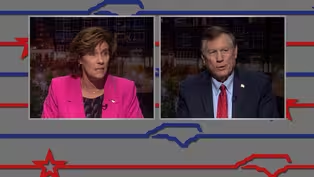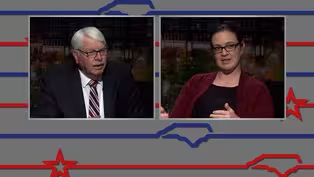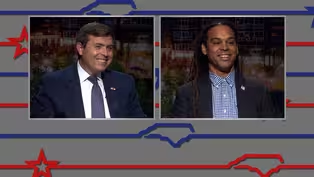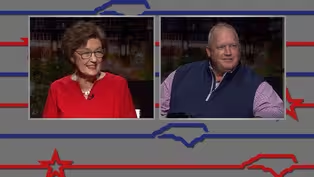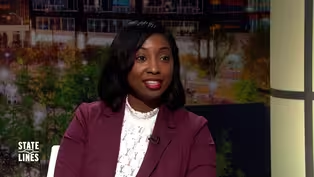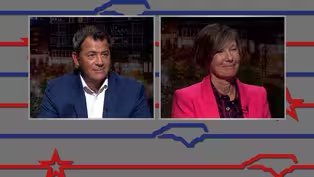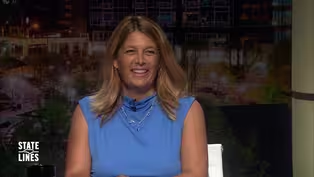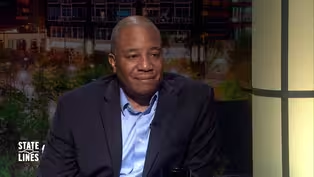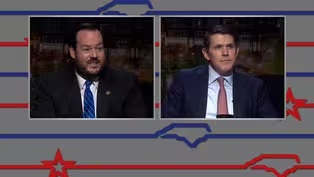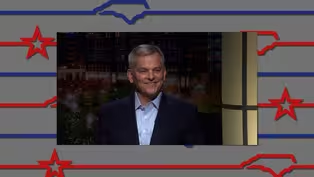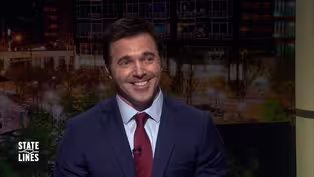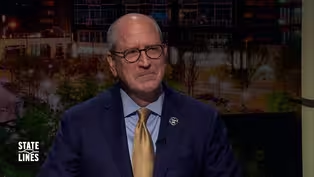
Dave Boliek, Republican Candidate for NC Auditor
Special | 12m 58sVideo has Closed Captions
An interview with Dave Boliek, Republican candidate for NC Auditor (2024).
Dave Boliek is running as a Republican for North Carolina's Auditor. He discusses his 2024 campaign with PBS NC's Kelly McCullen. This interview was recorded on Monday, July 29, 2024.
Problems playing video? | Closed Captioning Feedback
Problems playing video? | Closed Captioning Feedback
State Lines is a local public television program presented by PBS NC

Dave Boliek, Republican Candidate for NC Auditor
Special | 12m 58sVideo has Closed Captions
Dave Boliek is running as a Republican for North Carolina's Auditor. He discusses his 2024 campaign with PBS NC's Kelly McCullen. This interview was recorded on Monday, July 29, 2024.
Problems playing video? | Closed Captioning Feedback
How to Watch State Lines
State Lines is available to stream on pbs.org and the free PBS App, available on iPhone, Apple TV, Android TV, Android smartphones, Amazon Fire TV, Amazon Fire Tablet, Roku, Samsung Smart TV, and Vizio.
Providing Support for PBS.org
Learn Moreabout PBS online sponsorshipMore from This Collection
During major election cycles, PBS North Carolina's public affairs team sits down for in-depth conversations with candidates running for Governor and Council of State positions. PBS North Carolina has invited major party candidates to a one-on-one interview with State Lines host and executive producer Kelly McCullen. Interviews are scheduled throughout the summer.
2024 NC Commissioner of Insurance Candidates
Video has Closed Captions
Mike Causey (R) and Natasha Marcus (D) discuss their campaigns for NC Commissioner of Insurance. (26m 46s)
2024 NC Commissioner of Agriculture Candidates
Video has Closed Captions
Sarah Taber (D) and Steve Troxler (R) discuss their campaigns for NC Commissioner of Agriculture. (26m 46s)
2024 NC Commissioner of Labor Candidates
Video has Closed Captions
Luke Farley (R) and Braxton Winston II (D) discuss their campaigns for NC Commissioner of Labor. (26m 46s)
2024 NC Secretary of State Candidates
Video has Closed Captions
Elaine Marshall (D) and Chad Brown (R) discuss their campaigns for NC Secretary of State. (26m 46s)
Jessica Holmes, Democratic Candidate for NC Auditor
Video has Closed Captions
An interview with Jessica Holmes, Democratic candidate for NC Auditor (2024). (12m 32s)
2024 NC Lieutenant Governor Candidates
Video has Closed Captions
Hal Weatherman (R) and Rachel Hunt (D) discuss their campaigns for NC Lieutenant Governor. (26m 46s)
Michele Morrow, Republican Candidate for NC Superintendent of Public Instruction
Video has Closed Captions
An interview with Michele Morrow, GOP candidate for NC Superintendent of Public Instruction (2024). (12m 57s)
Maurice "Mo" Green, Democratic Candidate for NC Superintendent of Public Instruction
Video has Closed Captions
An interview with Mo Green, Democratic candidate for NC Superintendent of Public Instruction (2024). (13m 7s)
Video has Closed Captions
Wesley Harris (D) and Brad Briner (R) discuss their campaigns for NC Treasurer. (26m 46s)
Video has Closed Captions
Josh Stein (D) discusses his campaign for NC Governor. (26m 46s)
Jeff Jackson, Democratic Candidate for NC Attorney General
Video has Closed Captions
An interview with Jeff Jackson, Democratic candidate for NC Attorney General (2024). (12m 50s)
Dan Bishop, Republican Candidate for NC Attorney General
Video has Closed Captions
An interview with Dan Bishop, Republican candidate for NC Attorney General (2024). (12m 44s)
Providing Support for PBS.org
Learn Moreabout PBS online sponsorship[stoic dramatic music] [stoic dramatic music continues] - Joining us is Republican nominee for state auditor, Dave Boliek.
Hello, Mr. Boliek.
Welcome to "State Lines."
- Great.
Glad to be here.
- First of all, every question for every Council of State candidate is, who are you?
What's your background?
What makes you run for state auditor?
- Well, I am Dave Boliek, and I've been married for 30 years to the same wonderful woman.
We've got four great kids.
I'm an attorney by trade.
I also have a master's degree in business administration, so I've owned businesses, signed the front of a paycheck, as well as worked for a living, and signed the back of a paycheck.
Over the last several years, I've chaired the board of trustees at the University of North Carolina at Chapel Hill.
And my work there, particularly with respect to the budget and the way the university at Chapel Hill was budgeted, really sparked my run for state auditor.
- What was it about the budget process of the UNC System?
By the way, as a disclaimer, we're part of the UNC System.
Did you see something you didn't like, or you just saw a process you'd like to know more about?
- Well, we did.
In fact, when you're put on the board, the first thing, just like any other nonprofit board, you go to kind of an onboarding session, and I was informed, along with new board members who were coming on, that the UNC-Chapel Hill was run by 16 separate budgets.
Now, not 16 parts of a budget, but 16 separate budgets.
And I found that to be confusing, particularly when you're dealing with more than $4.4 billion a year in annual spending.
So what we endeavored to do was to consolidate that to what's called an all-funds budget.
And in doing so, we discovered at UNC-Chapel Hill a $100 million structural annual deficit, which had had that continued, it would be north of 400 million today.
So we made some hard decisions and hard changes.
That budgeting model, incidentally, has been adopted by all of the System schools, including UNC, PBS North Carolina TV, in terms of a way of handling and structuring the budget.
- When it comes to budgets of those numbers, four billion for university.
Now you're looking at a $30 billion state budget that runs every year and probably $100 billion in assets in the state that the auditor could look into when he or she is elected.
So, how do you scale it up?
Do you see very big differences in the process?
- Yeah, I think, certainly, there are differences in the process.
One of the things we did do at Chapel Hill, which I want to take that experience into the state auditor's office, is at the time I joined the board, we didn't have an audit committee, for example.
So, I established an audit committee at UNC-Chapel Hill.
We were then able to take a look at performance and areas of performance.
So, while I believe there have been some strong things that the state auditor's office has done over recent years, particularly in the area of municipal audits and auditing municipalities, I can point to an audit that former auditor Beth Wood did of the city of Rocky Mount where there was improprieties found in terms of members of the council using city dollars for personal benefit.
Those types of audits certainly need to continue in the auditor's office, but I intend to sort of ramp up what I would call performance audits.
And that's taking a look at economy and efficiency of state government agencies and institutions and program results.
What are the results?
What are taxpayers getting for programs and agencies, for that matter, that are funded in North Carolina?
What's our return on investment?
So we're gonna take a hard look if I'm elected at performance as well as the bread and butter of what I call financial and compliance audits.
- It's an interesting answer because my next question was how proactive should a state auditor be?
Should they look into programs that appear to be working well?
Should they wait for problems to bubble up and then look at what's going on and attempt to document it, and then see about getting it repaired?
- Yeah, so my approach would be to be proactive.
And so I appreciate the question.
For example, on the campaign trail, I have pledged to audit the Department of Motor Vehicles on day one.
And the reason is because I believe our state needs to be focused with respect to the taxpayers and the citizens on customer service.
And I've traveled from Murphy to Manteo, so to speak, the old saying, all across this state, and I hear story after story about the Department of Motor Vehicles.
Shouldn't be that hard to get a driver's license.
Shouldn't be that hard to walk in or get an appointment to get a driver's license in the state of North Carolina.
Now, I don't know the result of what a performance audit would be, and I don't pretend to tell anyone what that result would be, but I think the citizens of North Carolina are due, for example, a performance audit on the DMV.
Now, what that does, Kelly, is that sets the tone for other state agencies.
That'll let other state agencies and institutions across North Carolina know the approach that I'm gonna take as the state auditor to look toward making our state government more customer service oriented.
- If you thumb through a state audit, at least in recent years, it's mainly dollars and cents.
Money is spent well, money is not spent well, needs to be corrected.
What's the difference in that and a performance audit?
Performance audit sounds like you're not looking necessarily a dollars and cents, you're looking at, I guess, operations and how things flow, right?
- Right.
To be clear, we need to continue with the state auditor to look at the financial nuts and bolts of state government.
But performance audits take a look at processes and procedures.
Timelines, what is the resulting?
For example, answer the question, when somebody needs a driver's license... We'll go back to DMV.
Somebody needs a driver's license renewed, what does that look like?
What is the timeframe from needing it?
Contacting the DMV?
How they contact DMV?
What is the response rate?
What is the timeframe on somebody actually needing a license and then getting that license?
Those are the types of questions that I think, for example, in a DMV audit that we would want to answer.
- How do you separate your opinion of how it should work as Dave Boliek versus how it should work as state auditor, as part of a government apparatus?
- Well, I think it's really important also to understand that I believe, as state auditor, you have to leave party politics at the door.
The state auditor needs to be an impartial looker of facts.
[laughs] To say it kind of in North Carolina plain speak.
We need to be able to take a look at all state government regardless of party affiliation.
And we need to be able to really take the approach of how can state government work better for every citizen in North Carolina.
And that's regardless of party affiliation.
- You know, these races are all partisan: Democrat, Republican.
You say it should be nonpartisan once you're elected.
How long does it take to separate the idea of being on the campaign trail?
Clearly on your literature, you're a conservative, you're a Republican.
Should Republicans expect anything out of you because you use those terms when seeking the office?
- Well, I think from the Republican Party standpoint, I think what citizens can expect from me is a conservative approach.
Taking a look at things with a really sharp eye.
I've proven that in my public life, that I'm not afraid to ask tough questions, I'm not afraid to hold people accountable, and I'm not afraid to do what's right on behalf of the taxpayer.
I mean, I've said on the campaign trail, and I believe this, that these Council of State positions are really important.
And what's needed are folks in those offices with the courage to stand up for what's right for the people of North Carolina in the face of opposition.
Because anytime you take a hard look at the way things are done, there's gonna be natural opposition.
That doesn't mean that it needs to be adversarial.
But there will be opposition to performance audits in state government.
You gotta have the courage to move forward.
- But what you know about the auditor's office right now, is that team equipped to do more performance audits, or are you adding performance audits to the existing plate?
Are you dialing back on financial audits to focus on performance audits?
- So, there is a team in place that currently is charged with doing performance audits.
I quite frankly think we need do more of that.
I also think that we need to take a really hard look at the technology needs in the auditor's office.
My impression is from the information that I have on the current auditor's office is we have some hardworking professionals there, but we need an uptick in technology, not to displace auditors and team members in the auditor's office but to make them more effective.
- How do you make that case to budget writers?
I've heard this under the secretary of state's office.
Now, she's a Democrat.
Republicans run the state, you'd be a Republican auditor.
How do you make the case to invest back in state agencies?
Because I would presume some conservatives think that's not a good look and that's an expansion of government.
- Well, I think it goes back to ROI, return on investment, from programs across state government.
What the auditor can do, if that office is run correctly, can take a hard look at programs that the general assembly funds and ask the first most basic question: What is the return on investment for taxpayers?
If we can find programs that are giving a fantastic return on investment to state taxpayers and citizens we need to highlight that.
But when we're not getting the return on investment that taxpayers and the general assembly expect, then we need to call it out.
And I think it's really important for an auditor to have the courage to give recommendations.
For example, if a program is not returning investment to taxpayers, the recommendation needs to be to the governor and to the general assembly to defund the program and reapportion those dollars.
I think, if technology is needed in terms of a budget allocation and a request, we can pay for that by making government more efficient and more productive for taxpayers.
- I noticed something in your campaign literature that I was reading online, you mentioned the culture of the state auditor's office because if you take over, you're inheriting a team, a stable team, and some of them you probably can turn over and a lot of folks are protected by the Employee Protection Act, the state.
So what kinda leader are you, and how do you get the Boliek culture in that office with the limitations placed on you by the state?
- Well, I think what I mean by culture, and I appreciate the question, is being willing to be courageous in the face of state agencies regardless of party affiliation, first.
In our professional world, need to be very focused on the taxpayer and how can we make government... And I sound like a broken record, but I really think this is where the state auditor can really, really do great things for the state of North Carolina and for our citizens.
We need to ask the question, what return on investment are we getting for dollars in state agencies?
Because once the general assembly appropriates money, that money is out the door.
The horse is out of the barn, so to speak.
So it's incumbent upon the state auditor to take a hard look, ask the tough questions, and then return real recommendations.
Not just, "Oh, here's the result," but take a focus of "What are we recommending?
"Can we give some solid common sense recommendations "to the general assembly that they could at least consider "in terms of change if that's necessary?"
- Last 15 seconds.
In your opinion, state government working well?
Not working well?
- I think there's a lot of things about state government that work well.
I think we have some fantastic state employees and team members across the state whose primary interest is doing what's best on behalf of the taxpayers.
But I think the auditor's job is to find where we can make improvements.
- All right, David Boliek, GOP nominee for state auditor.
Thank you, sir.
- Thank you, Kelly.
Thanks for having me.
[stoic dramatic music] [stoic dramatic music continues]

- News and Public Affairs

Top journalists deliver compelling original analysis of the hour's headlines.

- News and Public Affairs

FRONTLINE is investigative journalism that questions, explains and changes our world.












Support for PBS provided by:
State Lines is a local public television program presented by PBS NC
